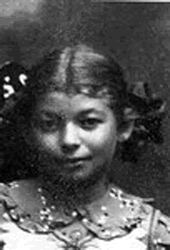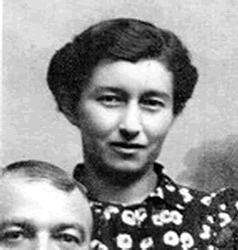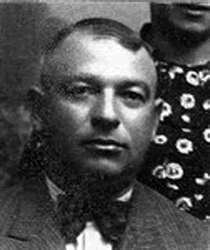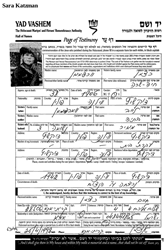Vorfman/Warfman Family
Click
on Photos to Enlarge
#vfm-1
Sima Varfman was born in Duksht, Poland in 1928 to David and Gnesia. She was a pupil and a child. Prior to WWII she lived in Parafjanowo, Poland. During the war she was in Parafjanowo, Poland. Sima was murdered/perished in 1942 in Duksht, Poland at the age of 14. This information is based on a Page of Testimony (displayed on left) submitted by her aunt, a Shoah survivor
Sima Vorfman
Birth:
1928
Dokshitz, Belarus
Death:
1942 (14) (Murdered by the Nazis)
Immediate Family:
Daughter of David Vorfman and Gnesia Vorfman
Sima Varfman was born in Duksht, Poland in 1928 to David and Gnesia. She was a pupil and a child. Prior to WWII she lived in Parafjanowo, Poland. During the war she was in Parafjanowo, Poland. Sima was murdered/perished in 1942 in Duksht, Poland at the age of 14. This information is based on a Page of Testimony (displayed on left) submitted by her aunt, a Shoah survivor.
#vfm-2
Gnesia Vorfman (Volak)
Birth:
1904
Dokshitz, Belarus
Death:
1942 (38) (Murdered by the Nazis)
Immediate Family:
Daughter of Simcha Yolak and Sara Rivka Yolak
Wife of David Vorfman
Mother of Sima Vorfman
Sister of Chasia Kazinitz
#vfm-3
David Vorfman
Birth:
1900
Dokshitz, Belarus
Death:
1942 (42) (Murdered by the Nazis)
Immediate Family:
Son of Berl Vorfman and Chana Yocha Vorfman
Husband of Gnesia Vorfman
Father of Sima Vorfman
Brother of ? Vorfman
David Varfman was born in Dokszyce, Poland in 1900 to Berl. He was a sawmill manager and married to Gnesia nee Iolk. Prior to WWII he lived in Parafjanowo, Poland. During the war he was in Parafjanowo, Poland. David was murdered/perished in 1942 in Dokszyce, Poland at the age of 42. This information is based on a Page of Testimony (displayed on left) submitted by his sister-in-law, a Shoah survivor. Henia Vorfman kibutz Ramat Hakovesh??
#vfm-4:
#vfm-5
#vfm-6
#vfm-7
#vfm-8
#vfm-9
#vfm-10
#vfm-11
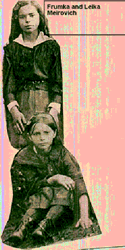
Fruma Varfman (Meirovitz)
Gender:
Female
Birth:
1903
Kurenets, Minsk Province, Belarus
Death:
1942 (39) (Murdered by the Nazis)
Immediate Family:
Daughter of Ben Zion Meirovitz and Perla Meirovitch
Wife of Zev (Velvl) Warfman
Mother of Bashinka Warfman and Perla Warfman
Sister of Aharon Meirovitz; Michael Meirovitch; Sara Meirovitch Eisen and Leika Meirovitch
WARFMAN, CELIA 7-MRL DOKSCHITZER 10/13/1914 Mount Zion Cemetery Maspeth, NY list of burials
WARFMAN, NATHAN 17-MRL DOKSCHITZER 8/16/1921 Mount Zion Cemetery Maspeth, NY list of burial
David Warfman
Gender:
Male
Birth:
circa 1849
Immediate Family:
Son of Shneyer Warfman
Husband of Riva Warfman
Father of Yisroel Dov Warfman
Added by:
Mordechai Naftalis on March 4, 2008
Nachman Warfman
Gender:
Male
Birth:
estimated between 1880 and 1940
Immediate Family:
Son of Yisroel Dov Warfman and <private> Warfman
Husband of Rose Warfman
Father of Yisroel Dov Mordechai Warfman and <private> Gruner (Warfman)
Brother of David Warfman; Fania Warfman; Zalta Warfman and Shneior Warfman
Added by:
Mordechai Naftalis on June 21, 2007
Managed by:
Mordechai Naftalis and Samuel Royde
-
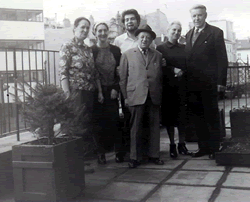
Nachman Warfman front middle
------------------------------ --------------------------
The Holocaust in Town
by Mordechai Warfman
June 1941. The Germans have arrived in our town. The ghetto was created and the Nazi conquerers appointed a "Judenrat" (a Jewish council) and a Jewish police whose job it was to implement the Nazi orders and to be responsible for the Jewish acts. They had to supply man power from among the Jews, according to a quota set beforehand. The overcrowding in the ghetto was unbearable. We lived three or four families in a small apartment. The first "Action" in our town took place in "Hol Hamoed" of Passover in 1942. Despite the fact that part of the ghetto residents were executed, life went on as usual, as if nothing had happened. Two of the townsmen, Arie Lifshitz and Pesach Velble, were found dead in the synagogue, as the Germans did not have time to take them. A day after Lag Baomer (33 of the Omer), the second "Action" took place. A considerable part of the town's Jews were exterminated in this "Action". The Germans demanded a hundred young healthy men for work from the Jewish police. I was among the hundred chosen. The Germans led us to the Polish school and ordered us to run and sing. The soldiers beat us with sticks until we bled. At noon we were sent back to work. The third "Action" occurred immediately after "Shavuot". This was the last "Action" which was supposed to completely exterminate the whole Jewish population of Dokschitz. Many Jews tried to escape this bitter end by hiding in sewers or bunkers. My uncle and I hid in a bunker during ten days. At night we would leave to search for food. A day before I escaped, I heard screaming from the house next door. It was the house of Nahman Zalkind and his daughter Masha Kosowsky. Nahman Zalkind, his daughter Masha Kosovsky and her children - the elder daughter, Riva Zlate and the son Jacob were taken brutaly by the Nazies. The son Leibel was in German captivity from 1939 and nothing is known of him to this day. The youngest daughter, Libe Lea survived and lives in Israel. That night, my uncle and I escaped and crossed, on our way, the Berezina river. Under German fire, we managed to escape and began looking for partisan units. We finally found a partisan unit and joined it, fighting between the years 1942 and 1944. I remember the attack we effectuated before the arrival of the Red-Army in June of 1944. The Germans ran for their lives. We set up an ambush their path and succeeded in killing 200 of them and also imprisoned many. When we were near Polotsk, Malnikov headed the partisan unit of which I was part. Later, Alchziov was appointed in his place.
On June 28, 1944 we succeeded in contacting the Red-Army. They let us join their ranks after letting us rest for a month. I was sent to the Minsk area where I was given an artillery course which lasted two months. After successfully passing the course, I was sent to the Visla area, about 30 km from Warsaw. Toward the middle of January 1945 we opened an all out attack. We advanced all the way to the Oder river and made camp in it's vicinity for two weeks until the bridges were built. We crossed it under the cover of darkness and arrived all the way in Berlin where we fought bitter battles in the streets. After the war I remained in the regular army for another year and then returned to Russia, from which I moved to Poland, where I stayed a few months and came to Israel.
